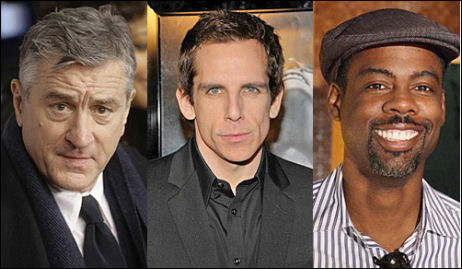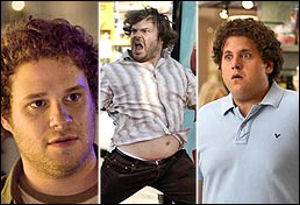Hillary Clinton “is running around talking about how this is an insult to sportsman, how she values the second amendment. She’s talking like she’s Annie Oakley. She’s out there like she’s on the duck blind every Sunday. She’s packing a six-shooter.” — Barack Obama riffing earlier today on Hillary’s very recent stump fetish about guns, being taught to shoot by her dad and drilling ducks with buckshot. Play this while reading and reflecting.
Day: April 13, 2008
Deciphering Agency Analysis
Some random responses to John Horn‘s 4.14 L.A. Times piece exploring the why and wherefores of the recent talent-agency shakeups. I’ve read it twice and I still haven’t absorbed the “there” that is presumably there. I’m in the middle of a third read as we speak. I’m down to reading sentences out loud and repeating them until the “oh, now I see!” kicks in.

The intra-agency trades “are related to growing anxiety over the future of the film business,” he writes. How do you quantify “growing” anxiety? The talent representation business runs on anxiety. Agents feed on it. It’s the one constant that has permeated the business since the days of silent pictures. A monkey with claws dug in to every player and every career. John Horn, trust me, is himself haunted by it. I eat anxiety for breakfast. To me it isn’t a monkey but a gorilla, but on some level I’m resigned to that.
Robert DeNiro going from CAA to Endeavor is a big “whoa”? In whose mind? In the eyes of the critics and reading public the man is finished as any kind of heavy talent or formidable player. He’s made too much crap, taken too many paycheck jobs. One look at that godawful Righteous Kill trailer and you go, “Jesus, God… what happened?” Every second or third film the man makes could and should be something smallish, soulful, risk-taking. Whoever you may consider to be the Robert Bresson, Luis Bunuel, Pier Paolo Pasolini or Michelangelo Antonioni of our time, DeNiro should at least be trying to hook up with these talents. Has he? Doesn’t seem like it.
“Instead of gambling on a broad and eclectic slate of movies, the studios are making creative decisions as much on spreadsheet projections as gut reactions to great screenplays,” Horn reports. “Studios not only are making far fewer films but also allowing concepts and marketing hooks to govern greenlight decisions rather than a specific actor’s availability and interest.” Haven’t producers been lamenting “high concept” thinking since the early ’80s? Groaning how difficult it is to get a movie going that isn’t driven by a simple, easy-to-digest marketing hook? This has been a Hollywood malaise issue for a long time now. What’s new here?
Two of the significant talent switches listed by Horn are those by actors Ashton Kutcher (from Endeavor to CAA) and Jennifer Connelly (ICM to CAA). No offense, but who cares what Kutcher is up to? I admired Connelly’s work in House of Sand and Fog and A Beautiful Mind, but are her representational loyalites matters of any real interest to anyone? I’m not trying to be an asshole. I’m just asking.
“The head of production at one studio said that when his movie budgets now grow too expensive, he insists that actors give up one of their prized perks: a percentage of every dollar that comes in.” Ooohh, poor babies!
“Several managers said that many actors who were once guaranteed to open a film at the box office are no longer a sure bet, as was proved by the poor openings for Will Ferrell‘s Semi-Pro and George Clooney‘s Leatherheads.” Ferrell has done fairly well until recently, but when has Clooney (whom everyone loves) ever opened anything?
Scott Hearts Ebert
A Sunday tribute piece by N.Y. Times critic A.O. Scott about Roger Ebert, specifically about his return to regular written film criticism despite his retirement from TV punditry, which was announced on April 1st.
Tinseltown Ten
Politico‘s Jeff Ressner has posted a roster of ten younger Hollywood heavyweights (i.e., younger than old-guard Hollywood liberals like David Geffen, Mike Ovitz, Stanley Sheinbaum, Norman Lear, etc.) who constitute a “newer army of Hollywood political heavyweights… mostly unknown showbiz executives in Los Angeles [who are] working behind the scenes in left-leaning politics: hosting Democratic Party fundraisers, sponsoring anti-war rallies, organizing abortion rights events, backing environmental legislation or producing message movies that promote peace, love and understanding.”
The “Tinseltown Ten,” he proclaims, are (1) Sony Pictures chairman and CEO Michael Lynton; (2) Wild Brain CEO Charles Rivkin, (3) Star Trek director and Cloverfield producer J.J. Abrams; (4) Rhino Records co-founder Richard Foos; (5) producer Lawrence Bender; (6) producer and “viral video campaign” orchestrator Julie Bergman; (7) Marvel Enterprises COO and Brave New Films co-founder Rick Jacobs; (8) Participant Media’s Jeff Skoll; (9) agent Ari Emanuel; and (10) former actress, philanthropist and networker Heather Thomas.
Hottie-Galumph Redux
The Calgary Sun‘s Kevin Williamson posted an article today (both on the Sun‘s website and on Canoe Jam) about the Judd Apatow myth-fantasy of hotties being attracted to and going out with galumphs, and he quoted yours truly as follows:

“This is all Judd reliving the dynamics of his marriage. I think everyone knows down deep that…birds of a feather flock together. It’s very unusual for hotties to be with galumphs. Ask anybody. The only reason it happens, and it’s the same in this town as it is in New York and elsewhere, is that the guys are very witty, which women love and find sexy, but also very loaded and have connections.
“Seth Rogen in real life is a hip, smart guy. But he’s playing slackers who wear Cabo San Lucas T-shirts and smoke doobies, and that doesn’t work to my understanding. The only time you’re going to have a guy who’s a 6 with a girl who’s an 8.5 is when it’s about power.”
An actor friend put it to me thusly a few years ago: “All women the world over lie down for the conqueror.” Which is just another way of phrasing the old Oliver Stone–Tony Montana-ism, to wit: “First you get the money, then you get the power, then you get the woman.”
Bill Saves The Day
Blabbering Bill Clinton, bless him, has rescued Barack Obama from the “working-class Pennsylvanians are bitter” rap. Or he did 17 years ago, rather. It was revealed today by the Huffington Post‘s Nico Pitney that in September 1991 Clinton said pretty much the same thing that Obama has been taking heat for when he referred to blue-collar bubba voters as “all these economically insecure white people who are scared to death,” in a September 1991 Los Angeles Times article.
Which is more insulting to a typical Pennsylvania blue-collar Reagan Democrat — being called “scared to death” or “bitter”? Isn’t it more manly to be bitter than scared? I would probably feel better about “bitter” if I was a rifle-owning, gay-marriage-hating, churchgoing Pennsylvania union guy.
In November 1991 Joe Klein, writing for the Sunday Times, reported that Clinton made the following remarks: “You know, he [George H. W. Bush] wants to divide us over race. I’m from the South. I understand this. This quota deal they’re gonna pull in the next election is the same old scam they’ve been pulling on us for decade after decade after decade.
“When their economic policies fail, when the country’s coming apart rather than coming together, what do they do? They find the most economically insecure white men and scare the living daylights out of them. They know if they can keep us looking at each other across a racial divide, if I can look at Bobby Rush and think, Bobby wants my job, my promotion, then neither of us can look at George Bush and say, ‘What happened to everybody’s job? What happened to everybody’s income? What…have…you…done…to…our…country?”
Tracey Torrents
Bruce McDonald‘s The Tracey Fragments (Thinkfilm, 5.9) is apparently the first feature ever to be composed entirely of “Mondrian-like” split screens. The Canadian-produced film is also propelled, to go by festival reviews, by Ellen Page‘s tour de force performance as 15 year-old Tracey Berkowitz, who recaps her recent history as she “sits on the back of a city bus, naked except for the tattered curtain she’s wrapped in, and looking for her missing brother, whom she fears she has hypnotized into believing he’s a dog.”

I’ve avoided seeing this film for a long time (it was first screened at the 2007 Cannes market, and then shown at Toronto last September, then at the AFI Festival in November). Now the release date is less than a month off, the side-stepping is over and I’m going to have to face it like a man. I just don’t want to know about a girl whose brother thinks he may be a dog. I’m done with that stuff in my life. I’m not much for nearly naked teenagers in the backs of buses either. I’ve been in some very strange places in my youth and can relate on some level, but even when I was a somewhat reckless and irresponsible kid I didn’t know anyone who was screwed up enough to think they were a dog, and if I did I would have avoided them like the plague.
I love the fact, however, that The Tracey Fragments was filmed in 14 days but took 9 months to edit. I also love the fact that “as part of the promotion for the Canadian release, the distributor released all of the original footage as downloadable torrent files and encouraged people to re-edit the footage into whatever they saw fit…this is believed to be the first theatrically-released film to make its footage available in such a fashion….entries ranged from music videos to a complete re-edit of the film in linear order, without split screens.”
Better Left Alone
In his Friday (4.11) column, Variety‘s Peter Bart pointed to three recent instances in which distributors seemed to step away from apparent clunkers — Valkyrie, Leatherheads and Drillbit Taylor — or at least try to wash their hands of the odor. Their “bad habits,” he said, have included the following:
* “Scheduling, then canceling, critics’ screenings. As in the case of Leatherheads, this is the equivalent of announcing to the media community that a picture doesn’t play. The critics will hammer it anyway, but maybe a couple of days later.”
* “Scaling down expectations: As with Drillbit Taylor, the marketing folks created a lowball forecast for the opening weekend, then gloated when they hit that number. None of this gets away from the basic fact that the film didn’t perform.”
* “Delaying release dates: When studios say they’ve found a ‘more appropriate’ date for a film many months later, the subtext usually is they don’t want red ink splashed over their quarterly results. Valkyrie, starring Tom Cruise, has been delayed twice (it’s now slated for 2.13.09) and, while United Artists insists the film has excellent prospects, the glimmer of doubt is still put out there.”
Garlic Stew
It’s a tired subject ’round these parts, but N.Y. Times columnist Frank Rich, having recently seen Errol Morris‘s Standard Operating Procedure (Sony Classics, 4.25 NY, 5.2 LA), is apparently confronting it for the first time: “Iraq is to moviegoers what garlic is to vampires.”
Standard Operating Procedure, he believes, “will reach the director’s avid core audience, but it is likely to be avoided by most everyone else no matter what praise or controversy it whips up.
“It would take another column to list all the movies and TV shows about Iraq that have gone belly up at the box office or in Nielsen ratings in the nearly four years since the war’s only breakout commercial success, Fahrenheit 9/11. They die regardless of their quality or stand on the war, whether they star Tommy Lee Jones (In the Valley of Elah) or Meryl Streep (Lions for Lambs) or are produced by Steven Bochco (the FX series Over There) or are marketed like Abercrombie & Fitch apparel to the MTV young (Stop-Loss).
“As the New York Times recently reported, box-office dread has driven one Hollywood distributor to repeatedly postpone the release of The Lucky Ones, a highly regarded and sympathetic feature about the war’s veterans, the first made with full Army assistance, even though the word Iraq is never spoken and the sole battle sequence runs 40 seconds.
“If Iraq had been mentioned in Knocked Up or Superbad, Judd Apatow‘s hilarious hit comedies about young American guys who (like most of their peers) never consider the volunteer Army as an option, they might have flopped too.
“This is not merely a showbiz phenomenon but a leading indicator of where our entire culture is right now. It’s not just torture we want to avoid. Most Americans don’t want to hear, see or feel anything about Iraq, whether they support the war or oppose it. They want to look away, period, and have been doing so for some time.”
Wild Night

4.12, 8:55 pm, Genghis Cohen

4.12, 10:05 pm, Jones

4.12, 10:35 pm, Jones
Good Iron
“Saw Iron Man. Iron Man very good. Had nice phoner with Jeff Bridges (we talked a lot about Lloyd Bridges). Iron Man gonna be huge. Please don’t quote me.” — Top-drawer film critic writing from of a region outside New York and Los Angeles.
